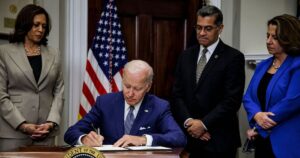Ethnic Serbs in northern municipalities of Kosovo bordering Serbia blocked roads and skirmished with police on the eve of the implementation of a law requiring them to replace their license plates with Kosovo plates.
The new rules had been due to come into effect Monday and would have required Serbian ID and passports holders to obtain an extra document to enter Kosovo, as is already the case for Kosovars entering Serbia.
Josep Borrell, the European Union’s top diplomat, welcomed a decision by Kosovo to delay the measures until Sept. 1 and called for all roadblocks to be removed immediately. In a statement posted on Twitter, the E.U. special envoy, Miroslav Lajcak, expressed gratitude to the U.S. ambassador to Kosovo, Jeffrey M. Hovenier, “for strong support.”
No one was injured in Sunday’s protests, Kosovo police said, even as gunshots were heard in a number of locations, some of them directed at police units. The protesters parked trucks and other heavy machinery on roads leading to two border crossings.
In a statement released Sunday, Kosovo announced the month-long delay on implementation of the new measures and condemned “the obstruction of roads in the north of Kosovo and the firing of weapons by armed persons there.” The statement said the “aggressive acts” had been instigated and planned by authorities in the Serbian capital of Belgrade.
Russia’s invasion of Ukraine has stirred wider tensions in the region. Analysts say the nationalist and revisionist worldview of Russia has found a receptive audience in the area, in particular in President Aleksandar Vucic of Serbia, Bosnian Serb political leader Milorad Dodik and Hungarian Prime Minister Viktor Orban.
Serbia, a traditional Russian ally, has rejected calls from the E.U. and the United States to join in sanctions against Moscow. Russia — along with China — still does not recognize Kosovo’s independence and decried NATO’s war against its ally. The Western military alliance launched a bombing campaign in 1999 that hit targets across what was then the combined Serbia and Montenegro in a bid to halt Serbia’s onslaught against ethnic Kosovar Albanians fighting for autonomy.
Maria Zakharova, a spokeswoman for Russia’s Foreign Ministry, accused Kosovo on Sunday of using the new licensing laws and ID documents as a step toward ousting the Serbian population.
“We call on Pristina and the United States and the European Union backing it to stop provocation and observe the Serbs’ rights in Kosovo,” she said, according to the Russian news agency Tass, describing the requirements as “discriminatory.”
“If they dare to persecute and mistreat and kill Serbs, Serbia will win,” Vucic said in a news conference Sunday. Kosovo’s prime minister, Albin Kurti, has accused Vucic of instigating the violence.
Chico Harlan, in Rome, and Ishaan Tharoor contributed to this report.


